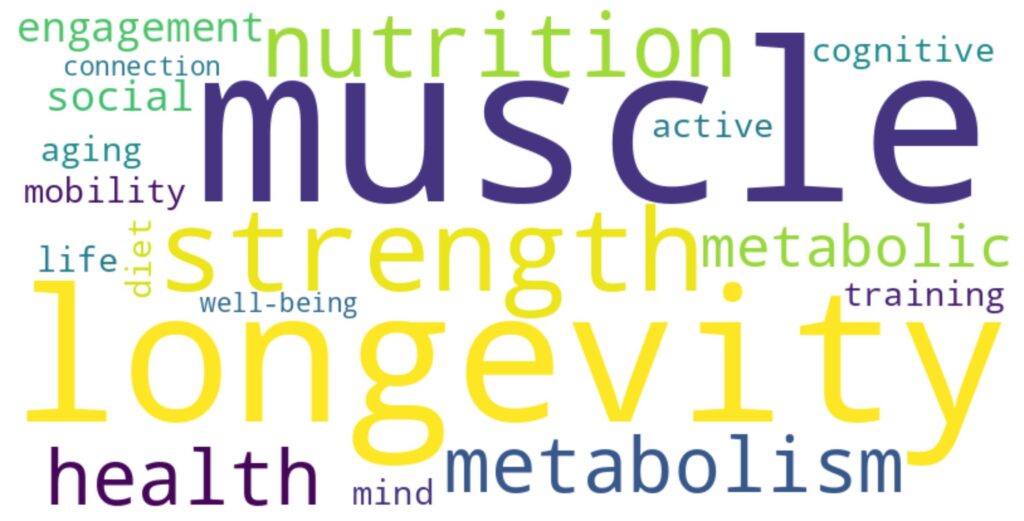By Dr. Tufail Shaik, MD; Pledge To Fitness Guest Writer and Client
Wondering how to live longer and thrive past 65? We’ve all heard that physical activity, eating well, and being socially engaged are essential for healthy aging. But here’s the thing: these aren’t just general health tips—they’re science-backed strategies for longevity that substantially increase life after 65.
Research findings suggest that people who maintain muscle strength, metabolic health, and cognitive engagement tend to live several years longer on average and enjoy a higher quality of life. Although the exact lifespan increase varies across studies, the evidence is clear: these three factors play a critical role in healthy aging and longevity. Let’s take a closer look at each of these key strategies for living longer, healthier lives.

1️⃣ Preserve Muscle & Mobility to Live Longer
Muscle strength is one of the strongest predictors of longevity. Strength training (2–3 times per week) helps prevent sarcopenia (age-related muscle loss), improves balance, and reduces fall risk. Studies show that maintaining muscle mass and strength is associated with lower all-cause mortality and greater independence in later years. This makes it one of the most effective strategies for longevity and a proven path for how to live longer.
2️⃣ Optimize Nutrition & Metabolic Health for Longevity
A protein-rich diet (~1.2–1.6g per kg of body weight per day), along with omega-3s, fiber, and antioxidants supports metabolic health. It also reduces inflammation, and lowers the risk of chronic diseases like heart or metabolic diseases, negatively affecting lifespan. Research consistently links dietary patterns such as the Mediterranean or DASH diet to longer life expectancy and improved overall health. Nutrition is one of the most overlooked strategies for longevity.
3️⃣ Stay Mentally and Socially Engaged for a Longer Life
Loneliness and cognitive decline are major risk factors for early mortality. Engaging in social activities, maintaining friendships, and stimulating the brain through learning, reading, or acquiring new skills can reduce dementia risk by up to 30%. Moreover, it also increasesemotional well-being. Individuals with strong social connections and purpose may live several years longer than those who are isolated.
Bonus Strategy: Prioritize Sleep and Manage Stress for Longevity
While muscle, nutrition, and social connection are key pillars of healthy aging, don’t overlook the power of sleep and stress management. Chronic stress and poor sleep are associated with increased inflammation, higher risk of heart disease, and accelerated aging. In contrast, consistent restorative sleep (7–9 hours per night) supports cellular repair, hormonal balance, and cognitive function. As a consequence, a good night sleep is a powerful contributor to how to live longer.
Simple habits like sticking to a bedtime routine, limiting screen time before bed, and practicing mindfulness or light stretching can improve both sleep quality and emotional resilience. Think of it as another essential layer in your strategies for longevity.
Final Thoughts: Small Steps, Big Impact
Healthy aging isn’t about perfection—it’s about consistently making choices that support your body, mind, and spirit. These science-backed strategies for longevity—strength training, good nutrition, meaningful social engagement, and quality sleep—are not just ways to live longer but to live better.
Take one step at a time. Start where you are. Your future self will thank you.
Ready to take the first step toward a stronger, longer life?
Book a free consultation with a Pledge Coach™ today and discover how personalized fitness, nutrition, and wellness strategies can help you thrive after 65.
As Dr. Tufail Shaik puts it, “Imagine staying active, traveling, and learning new skills well into your 80s—these three strategies can help make it a reality.”



